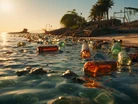Will a Global Plastics Treaty Finally Become Reality?

The battle against plastic pollution is at a critical moment, as governments, businesses and activists convene in Busan, South Korea, for the final phase of negotiations on a UN treaty to address the crisis.
Companies like Unilever, Nestlé, Danone and SAP are leading the call for a legally binding agreement, arguing that only global rules can tackle the scale of the problem.
For weeks, Intergovernmental Negotiating Committee-5 (INC-5) has been working to hammer out the details of a potential treaty.
The stakes are high, with Unilever CEO Hein Schumacher describing this as a "once in a generation" opportunity for change.
In his words, governments face a choice: “Fragmented, slow and costly… or coordinated, fast and cost-effective? This is the choice governments have in Busan when they meet to finalise the plastics treaty at INC-5.”
Hein and others argue that voluntary measures are no longer sufficient. They point to the fragmented landscape of national regulations, which creates complexities and uneven competition for businesses.
Instead, they are pushing for unified global rules that cover the entire lifecycle of plastics - from production and design to disposal.
Unilever, Co-Chair of the Business Coalition for a Global Plastics Treaty, also highlights four key areas they believe the treaty must address:
- Global criteria to phase out harmful chemicals and avoidable plastics.
- Sector-specific strategies for designing circular plastic products, such as packaging.
- Standardised principles for implementing Extended Producer Responsibility (EPR) schemes, ensuring producers take accountability for waste.
- A strong mandate for future improvements to the treaty.
According to Unilever, such measures would harmonise regulations, simplify supply chains and encourage innovation at scale.
Why do businesses want action?
The push from these major corporations may seem surprising - after all, they are part of the very industries responsible for much of the world’s plastic waste.
Yet, these companies argue that global rules would not only address environmental concerns but also create a more predictable and efficient business environment.
Unilever states that voluntary efforts, while important, have limitations.
"Voluntary initiatives distort the market," the company says, "because they often lead to higher costs. This means that companies taking action are at a competitive disadvantage compared to those not taking action."
The Business Coalition for a Global Plastics Treaty, comprising in excess of 250 organisations including financial institutions and NGOs, has echoed this sentiment. In a letter to world leaders, the coalition warned that a treaty based on voluntary measures alone “risks delaying action by decades” and could result in further regulatory fragmentation.
The letter also emphasised the importance of a circular economy - an approach in which plastic never becomes waste but is reused and recycled, retaining its value within the economy.
Signatories, including CEOs from PepsiCo, Mars Inc and IKEA, stressed their commitment to transforming business models to align with this vision.
Progress and challenges
Momentum for a treaty began in 2022 at the UN Environment Assembly, where 175 countries agreed to start negotiations.
However, reaching consensus on key details has proven challenging. The goal is to finalise the treaty text by the end of this year, but concerns remain over whether the final agreement will be robust enough to drive meaningful change.
Critics of voluntary agreements argue that they allow countries and companies to avoid responsibility, slowing down progress and undermining global efforts. Advocates for a legally binding treaty believe that clear, enforceable rules are the only way to create the level playing field needed to solve the plastics crisis.
Hein's view captures the urgency of the moment: “Business needs global rules.” Without them, the problem will continue to grow, costing both the planet and the economy dearly.
As INC-5 draws to a close, the world waits to see whether governments will rise to the challenge. The decisions made in Busan could shape the future of plastics - and the environment - for decades to come.
Make sure you check out the latest industry news and insights at Scope 3 Magazine
and be part of the conversation at our global conference series, Sustainability LIVE and Procurement & Supply Chain LIVE.
Discover all our upcoming events and secure your tickets today. Subscribe to the Scope 3 Magazine newsletter.
Scope 3 Magazine is a BizClik brand.
Featured Articles
Estonia, Latvia and Lithuania join the European grid, cutting ties with Russian energy, a move that boosts regional security and sustainability
TÜV SÜD: New battery regulations bring Scope 3 hurdles, requiring sustainable sourcing, digital traceability and design changes increasing compliance
Nissan is scaling up its use of green steel, reducing CO2 emissions in its supply chain as part of its goal to achieve carbon neutrality by 2050


